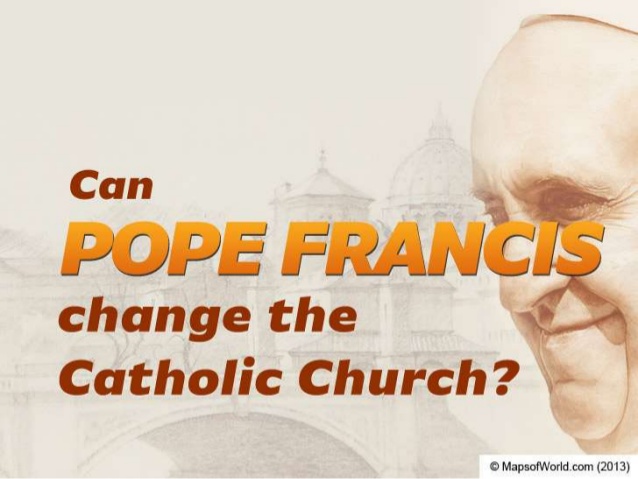People really need to take a deep breath. Folks are getting all het up about the pope’s decision on the death penalty.
“If he changed this he can change the rules about gay sex!”
This is coming from both the LGBT advocates (who are eager to push for change) and their opponents who are alarmed. Rod Dreher reports on some of it here saying it is a big win for LGBT Catholics.
But stop already.
In this post this morning I outlined what things can change in the Catholic Church and what cannot change.
It is really not that difficult. Doctrines and moral teachings that are part of the natural law or the law of God revealed in the Scriptures cannot be changed.
Disciplines of the church and secondary teachings that arose from particular cultural demands can change and exceptions can be made.
Not everything is infallible and immutable.
My own situation is a case in point. Celibacy for priests is a discipline of the church. It is a venerable and ancient tradition but it is not infallible teaching. Therefore it was possible for me to receive a dispensation from the vow of celibacy to be ordained as a Catholic priest. This was due to changing cultural circumstances.
The ordination of women to the priesthood, however, cannot be changed. This is because the male priesthood was instituted by Christ himself and the church cannot change what Christ himself instituted or that which Scripture and the natural order clearly reveals.
The pope cannot change something which, by its very nature cannot be changed. He can’t say blue is yellow and he can’t do things which are intrinsically absurd. He can’t say “From now on square is round.” Duh.
Likewise, when it comes to moral teachings, the pope cannot change what is part of the natural order and the revealed Word of God and the teachings of Our Lord.
So while disciplines can change, doctrines can develop. The criteria for authentic development of doctrine were outlined by Bl. John Henry Newman in his famous essay on the subject. You can read it here.
Put very simply, authentic development of doctrine must not only be in continuity with the past, but there must also be a natural growth which is consistent with the past and not contradictory. What seems to be an innovation must be a logical outgrowth of the original kernel of truth. Furthermore, the “new” truth must be seen to be already existent in seed form in the primitive teaching and the “new” truth must be a consolidation not a destruction of the “old” truth. Finally, Newman says there must be “chronic vigor” in the developing doctrine — in other words it presents itself as a vibrant and dynamic outgrowth of the old truth — not a lessening or diminution of that truth.
Folks are saying, “But he reversed the rule on capital punishment.” I don’t think so. Read the document.
Rather than a decision on capital punishment per se, it is argued that this is a full development of the doctrine of the innate dignity of each human being.
The LGBT activists want to say that the capital punishment rule changed according to shifting societal attitudes and since society has shifted its attitudes to gay sex the church can change this too. But this is a false comparison. Sexual intercourse between two men is intrinsically counter to nature and cannot be condoned. A ban on capital punishment, like a ban on slavery, can be seen as a natural development of the understanding of the dignity of all human life.
However, there is cause for concern with some of the present authorities in Rome–not because of formal changes in doctrine, but because of informal heresy and hypocrisy.
While the pope cannot make a formal change in the teaching which is immutable, it is obvious that crafty progressives are using the “development of doctrine” idea to bring about “pastoral’ changes. This is why the debate over Amoris Letitia got so heated. Progressives were bringing in change by stealth under the guise of “pastoral initiatives” for the divorced and re-married.
Knowing that formal change to immutable teachings is impossible they will bring in an increasing range of “pastoral initiatives” that introduce practices that are contrary to the formal teaching of the church. The dissenters will continue to push and push for this kind of change, and this is why their campaigns are so insidious.
The irony is that very often these same progressives whine and play the victim about how hypocritical the church is for denying mercy to this group or that group of faux victims, while nobody seems able to call their bluff and point out that by constantly undermining church teaching with contrary “pastoral practices” they themselves are hypocrites and heretics of the first order.







I don’t think the heterodox libs care about changing defined, Magisterial Church teaching. They only care about results (the ends justify the means). They only care about practices/actions. Remember Fr Charles Curran’s front page dissent the day after Humanae Vitae—it didn’t change Blessed Paul’s teaching, but it gave cover to millions of Catholics who wanted to contracept. Unfortunately, intrinsically immoral practices/actions can damn souls to hell. That is why targeting the CCC is the motherload for the libs: the CCC itself is not a Magisterial document. It is a summary of Scriptural and Magisterial teaching and informs consciences and guides practices/actions of many Catholics who don’t go back to the Bible or the Magisterial documents themselves. Now the libs have seen that they can corrupt the CCC; and now a corrupt summary of Church teaching will be the reference guide for millions of souls.